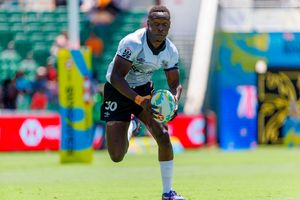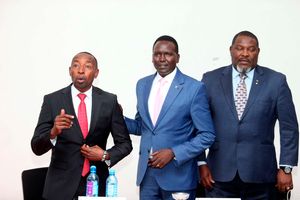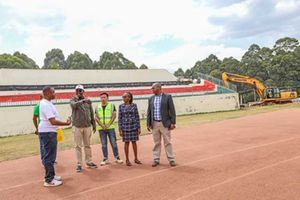Breaking News: Former Lugari MP Cyrus Jirongo dies in a road crash

Charles Mukora (left) is all smiles after retaining his position as chairman of NOC-K in 1997 together with his deputy Kipchoge Keino (left).
The 29 Olympics sports federation will meet in Nairobi on April 24 to elect the 10th president of the National Olympic Committee- Kenya (NOC-K).
It will mark the end of the tenure of five-time world cross country champion Paul Tergat who has served his maximum two four-year terms.
The field of contestants will be known 21 days after a notice for the Annual General Meeting is published.
This year’s elections will be the first competitive one for the post of the president in 26 years.
NOC-K last held competitive elections in 1997 when the late Charles Mukora beat politician and football administrator Peter Kenneth 17-16 in hotly contested polls. The big and successful federations like football had joined hands with liberal federations to try bring change to the body without success.
Kenneth, who had taken over the Kenya Football Federation chairmanship in 1996 was seen as the new face of the future and joined hands with emerging sports marketing guru, the late Sharad Ghai and other young like minded administrators to effect a generational change.
But Mukora’s camp resisted change. It remains a mystery of who was the ‘traitor” who sold Kenneth’s camp.
Mukora first took over NOC-K (then know as Kenya Olympic Association) leadership in 1988 following the demise of the president Mbogo wa Kamau.
Mukora had no challenger as he was a respectable senior executive of Coca Cola Africa, a company which spent a lot on sports sponsorship, was the first indigenous African track and field coach (1968/72 Olympiads) and previous chairman of Kenya Amateur Athletics association (KAAA).
Kamau had served for 10 years (1978-1988). He was a former senior police officer, businessman and was active in hockey, squash and badminton. He had also once served as an executive member of the Kenyan Hockey Union and the Kenya Sports Council.
It was under Mukora that KOA changed to NOC-K in 1990 when IOC introduced code names for each country for uniform identification of all its international federations (IF). Kenya was designated NOC-KEN).
Mukora, a former IOC member, the International Amateur Athletics Federation (IAAF) and vice chairman Commonwealth Games Federation was kicked out of IOC with six African IOC members following the Salt Lake bribery scandal that rocked the IOC.
Take over
Some members were accused of taking bribes to influence the host cities of Olympic Games. Mukora admitted taking $34,000 as a grant for sports development in Kenya from the organisers of the Salt Lake City Winter Olympics.
He resigned from all elective posts on January 27, 1999 and led a quiet life until his demise in 2018.
Immediately he stepped down, the NOC-K executive elevated vice chairman Kipchoge Keino to complete Mukora’s term but due to public and in-house demands, Keino went on to rule until 2017 when he threw in the towel and paved the way for Tergat.

National Olympics Committee of Kenya president Paul Tergat (left) with Athletics Kenya president Jackson Tuwei.
The departure of Keino was also marred in controversy following the debacle of missing uniforms and air tickets mix-up in the lead up to the 2016 Rio Olympics when three NOC-K officials -- secretary FK Paul, assistant secretary general James Chacha and Stephen Arap Soi, the Kenyan team’s Chef de Mission in Rio were arrested over corruption allegations.
On August 25 of that year Sports Cabinet Secretary Hassan Wario disbanded NOC-K and appointed a Probe Committee which, ironically, ended up implicating the SC for misusing the free air tickets.
He ended up paying a fine of Sh3.6m in 2021 while Soi was fined Sh114 million or a 15-year jail term. He ended up behind bars but was acquitted in 2023 by the High Court.
Tergat’s first term was to clean the house and despite being challenged in 2021 by his sole opponent Patrick Muyah he went on to retain his seat unopposed after the NOC-K General Assembly agreed that Muya was ineligible to vie.
Foundation
NOC-K was founded by the British Colonial Governor of Kenya Sir Evelyn Baring, Nairobi Mayor Reginald Alexander and city accountant R. S. Elliot on Valentine Day February 14 1955. It was then called Kenya Olympic Association.
Baring became the first Honorary President, Alexander chairman and R.S Elliot secretary. He then immediately dispatched a letter to the International Olympic Committee (IOC) President Avery Bruntage seeking KOA’s admission in the IOC which was granted on June 17 of the same year.
This paved the way for Kenya to send a team of 25 to the 1956 Olympic Games in Melbourne.
Alexander, who served as KOA chairman between 1955 to 1964, was the real reflection of elitism, serving a closed shop setup at KOA.
A chartered accountant and financial consultant, Alexander had also served as the chairman of the Kenya Oil Company and Mayor of Nairobi for one year, 1954 to 1955.
He served in that position unopposed until 1964 after Kenya attained independence when it was felt that it was only fair that Africans take over the leadership of KOA and other sports organisations.
Baring and Alexander identified Jeanes College Kabete (today part of the Government School of Administration) as the first official field station of KOA where Archie Evans, credited, together with Sir Derick Erskine, for forming the Kenya Amateur Athletics Association (KAAA) in 1952, was based as the Kenya Colony Sports Officer. It is here that athletics was founded and thrived before moving to Nyeri.
Evans identified Kirigo Barno, Nyandika Maiyoro, Maboria Tesot, Kiprono Maritim, Musembi Mbathi, Kiptalam Keter, Jonathan Lenemeria, Lazaro Chepkwony and Paul K. Boit who went into residential training at Jeanes College in 1956.
He joined the IOC in 1961 and continued to serve in various IOC commissions until 1975 starting in the Olympic Aid Commission from 1961 to 1967, including a term as Chairman (1966-1967), and the Commission of Enquiry for the Winter Games (1968).
He handed over the baton to Boit (1964-1968) as heir apparent at independent Kenya. Boit, who had schooled at Alliance Boys High School, competed in 1956 Olympics and was the team captain.
Son of a Nandi chief, with access to elite schooling at the independent era, he was a natural heir. Boit ultimately became the permanent secretary in the Ministry of Cooperatives, and later, in the Ministry of Home Affairs.
He gave KOA the profile of elitism with a deep rooted government connections that Mukora followed.
The sports administrators of the day never overstayed and Boit, having served one four- term did not seek re-election paving way for Musembi Mbathi, who had gone to the US for further studies after the 1954 Commonwealth Games, to become chairman.
Musembi returned home at independence and joined the civil services but still continued to be involved with sports. He served as the chairman of KAAA from 1964-1968 thereby earning the nod from KOA officials due to his experience.
He was KAO chairman from 1968 to 1971 and went on to win the position of vice-president of the Commonwealth Games Federation.
John Kasyoka, another versatile player in tennis, football, table tennis, badminton, golf and boxing, athletics and cricket headed KOA from 1971-1978.
He also served as the chairman of the Kenya Football Association (KFA) for eight years , the Kenya Table Tennis Federation and was a member of the executive of the Supreme Council for Sport in Africa by virtue of his chairmanship of Zone VI. He at one time headed the Kenya Film Censorship Board.










